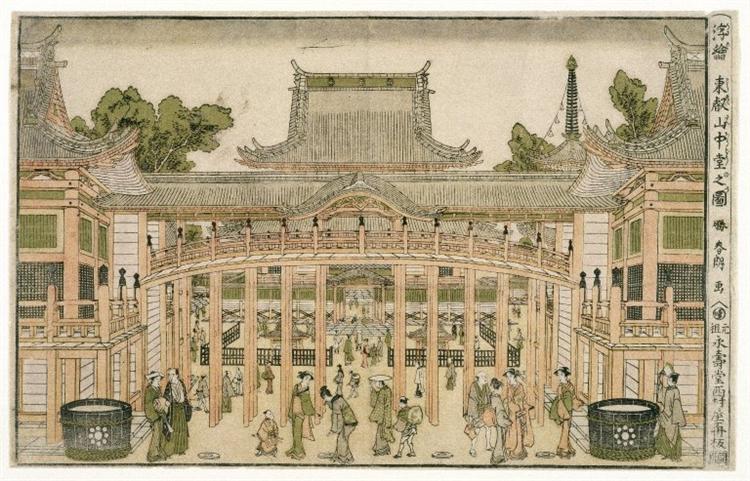Description
Katsushika Hokusai’s “Inside the Courtyard of Toeizan Temple in Ueno,” created in 1786, is distinguished by its ability to encapsulate the serenity and spirituality of a sacred setting in the Japanese tradition. One of the most celebrated artists of the Edo period, Hokusai is known for his mastery of depicting landscapes, everyday scenes, and themes of Japanese culture. This painting, while intimate in its approach, reflects the distinctive ukiyo-e style that Hokusai helped define, combining artistic traditions with notable innovation in composition.
In this work, the viewer is introduced to a courtyard that exudes calm and decorum. The architectural structure of the temple stands as a majestic backdrop, with curved roofs and ornamentation that reflect traditional Japanese aesthetics. The arrangement of elements in the composition is skillful; the architectural lines guide the viewer's gaze toward a focal point that, although not explicit, appears to be the intersection between heaven and the sacred. This handling of perspective is one of the characteristics that gives many of Hokusai's works their vibrant energy.
The colors in “Inside the Courtyard of Toeizan Temple in Ueno” play a crucial role in creating an atmosphere of tranquility. Earthy, natural tones predominate, evoking an intrinsic connection with nature. Deep greens suggest a fresh, livable space, while the grays and browns of the temple’s stones and structures provide a sense of stability and permanence. Hokusai displays a particular skill in balancing colors, creating a palette that provides both contrast and harmony.
The characters present in the painting – figures likely representing monks or visitors – are minimal and ethereal, resulting in an almost contemplative approach to their placement. These figures are not the central focus, but act as mere companions to the surroundings, suggesting the silence and solemnity of the place. This compositional decision allows the viewer to focus on the spirituality of the space rather than on the individual narrative.
Through subtle additions, such as the vegetation bordering the courtyard or the use of shadows, Hokusai manages to deepen the sense of three-dimensionality, enriching the visual experience. The palm trees and bushes around the temple not only serve to beautify the scene, but also create a dialogue between the building and nature, reflecting what Japanese culture at that time idealized: the harmonious coexistence between humans and their environment.
On the other hand, “Inside the Courtyard of Toeizan Temple in Ueno” is an excellent example of the ukiyo-e style (meaning “pictures of the passing world”) that flourished during the Edo period. Although it is known for its scenes of daily life and urban entertainments, this specific work moves away from the effervescence of urban life to concentrate on contemplation and spirituality, reflecting a deeper facet of ukiyo-e.
Furthermore, this painting is set at a particular time in Hokusai's life, who, in the 1780s, was beginning to achieve recognition not only in Japan, but also abroad. His talent for capturing the ephemeral essence of moments and spaces is evident in this work, adding a layer of contextual depth to the viewer's experience.
Hokusai has left a lasting legacy that continues to influence contemporary artists around the world. The painting “Inside the Courtyard of Toeizan Temple in Ueno” is a testament to his mastery and his ability to evoke contemplation and emotional connection through art. This work not only graces the history of Japanese art, but also invites reflection on the relationship between the sacred and the everyday at a time when Japanese culture was beginning to open up to the outside world.
KUADROS ©, a famous painting on your wall.
Hand-made oil painting reproductions, with the quality of professional artists and the distinctive seal of KUADROS ©.
Painting reproduction service with satisfaction guarantee. If you are not completely satisfied with the replica of your painting, we will refund 100% of your money.

